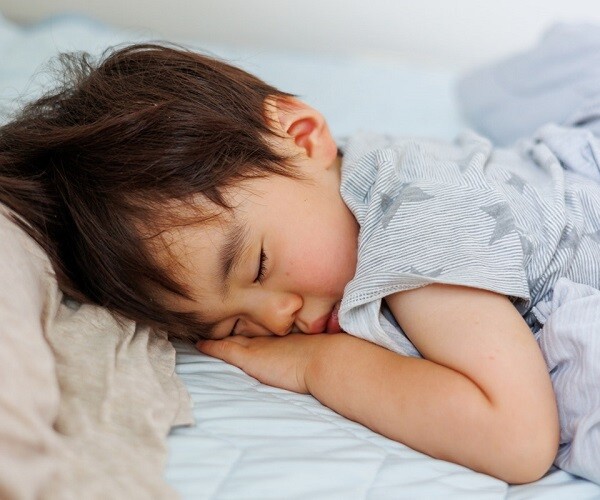We all know this instinctively, but how does sleep affect a child’s height and intelligence?


The Secret to Sleep
In reality, most animals in nature have a resting state similar to human sleep, but some animals have a different sleep pattern than us.
For example, koalas sleep 20-22 hours a day, sleeping almost their entire lives, while giraffes only need 1.9 hours of sleep per day, which is broken up into multiple short naps throughout the day.
Why do mammals have such diverse sleep patterns?
This actually reflects the survival intelligence of different species in adapting to their environments, as well as the mysteries surrounding human sleep.
Many people think that sleeping is a very simple activity. They just lie down in bed, close their eyes, dream a little, and the night passes.
However, the process of sleeping is not that simple.

Most animals in nature have a resting state resembling human sleep.
Scientific studies have found that human sleep occurs in 90 to 110-minute cycles, each consisting of stages such as non-rapid eye movement (NREM) sleep, rapid eye movement (REM) sleep, light sleep, and deep sleep.
The light sleep stage accounts for a large proportion of sleep time (around 50%). During this stage, human breathing, heart rate, and body temperature tend to stabilize and decrease, and the body relaxes.
The deep sleep stage is crucial for restoring physical strength and energy. Damaged cells and brainpower depleted by the day’s activities are replenished during this stage.
The REM stage is when the brain is highly active. During this stage, the brain not only processes and consolidates the day’s memories but also regulates various emotions.
These three stages work together to ensure that our bodies and brains can “reboot” normally the next day.

Sleep Quality Impacts Children’s Height and Intelligence
The National Sleep Foundation (NSF) of the United States once collaborated with several universities and research institutes to conduct a large-scale study.
The researchers recruited thousands of children of various ages, grouped them by sleep duration, and tracked them for several years.
The results showed that children who got sufficient sleep tended to grow taller, while those who didn’t get enough sleep were more likely to become overweight or obese.

Sleep quality impacts children’s height and intelligence.
A research team from the University of Zurich in Switzerland also selected 200 children aged 6 to 12, monitored their sleep quality through electroencephalograms, and then conducted a series of cognitive tests.
The results showed that children with higher sleep quality performed significantly better on academic tasks than those with lower sleep quality in terms of concentration, memory, and reasoning abilities.
There are many similar studies, but the conclusion is always the same: children’s sleep quality is linked to their height and intelligence.

The Two Golden Times for Children’s Sleep
Scientific research has discovered that during sleep, various hormones are released in the body, such as growth hormones, melatonin, cortisol, and others, which undergo significant changes.
By capturing these hormone secretion peaks, children can not only develop better brains but also grow taller.
Sleeping before 9:30 pm is beneficial
Numerous scientific studies have confirmed that during deep sleep, the brain forms more connections between neurons.
This means that learning and memory formation are easier and more effective during sleep than when awake. Children with good sleep quality have an intellectual advantage and often achieve twice the results with half the effort in their studies.
Research has found that the first peak of growth hormone secretion in the human body typically occurs between 10 pm and midnight.
According to the sleep cycle, to capture this “golden period” of growth hormone secretion, which is the key to cognitive and height development, children should go to bed before 9:30 pm.

Deep sleep helps the brain form more connections between neurons.
From 5 am to 7 am
While many parents don’t encourage staying up late, they may not object to early mornings.
However, what we may not realize is that this is precisely the second, smaller peak of growth hormone secretion. Waking children up during this time can interrupt the normal hormone secretion process and affect their height.
Additionally, the human body produces a hormone called cortisol, which follows a similar secretion pattern throughout the day and night.
During the day, cortisol levels gradually decrease and peak early in the morning before waking, helping children feel alert, cope with stress, and wake up after sleeping.
If parents suddenly wake their children during this time, it can disrupt the normal cortisol rhythm and make them feel tired and irritable due to the abrupt interruption of deep sleep, affecting their mental state and academic performance the next day.

How to Develop Early Sleeping and Rising Habits in Children
The National Sleep Foundation recommends that children aged 1 to 2 years old should sleep 11 to 14 hours per day, those aged 3 to 5 years old should sleep 10 to 13 hours, and those aged 6 to 13 years old should sleep 9 to 11 hours.
Refusing to sleep at night and resisting waking up in the morning seem to be the “default settings” for modern children.
So, how can we encourage early sleeping and rising habits? Experts share two fundamental practices for parents to follow.
Adults should set a good example
The reason many children nowadays don’t like to sleep early is due to the influence of their parents’ late sleeping habits. Before the age of 6, children depend on their parents. If parents don’t sleep early, children will also struggle to fall asleep.
Therefore, parents should lead by example, such as setting a specific time for washing up, turning off the lights, and going to bed.

Adults should set a good example for children.
Create a conducive sleep environment
Parents should limit children’s exposure to electronic devices or intense games one hour before bedtime.
Try transitioning to sleep-inducing activities such as storytelling, listening to soothing music, or taking a warm bath. Close the bedroom window, use blackout curtains, and create a cozy atmosphere for sleep after dark.
5 Bedtime Drinks to Soothe and Induce Sleep: Especially the Second One!
Introducing the Ultimate Evening Beverage Collection for Optimal Health!
Uncover the secrets to a healthier you with our carefully curated selection of evening drinks. Each beverage is meticulously crafted to offer a plethora of health benefits, ensuring you wake up feeling refreshed and rejuvenated.




































